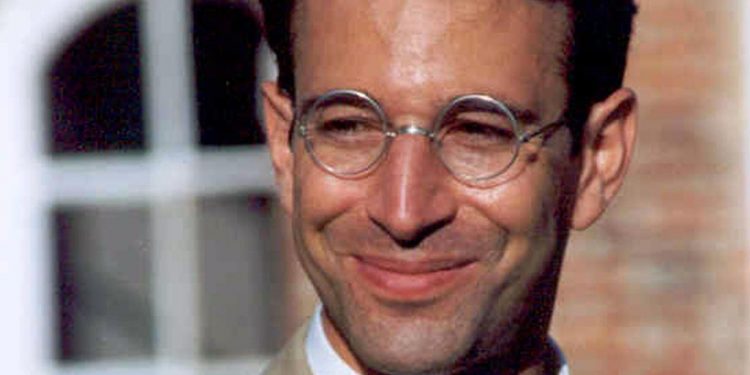Islamabad: Pakistan’s Supreme Court Monday rejected a petition filed by the Sindh government to suspend a high court verdict that overturned the conviction of al-Qaeda leader Ahmed Omar Saeed Sheikh in the kidnapping and murder of Daniel Pearl in 2002, in a setback to the US efforts to get justice for the American journalist.
Pearl, the 38-year-old South Asia bureau chief for The Wall Street Journal, was abducted and beheaded while he was in Pakistan investigating a story in 2002 on the alleged links between the country’s powerful spy agency ISI and al-Qaeda.
A two-judge Sindh High Court bench April 2 overturned the death sentence of British-born 46-year-old al-Qaeda leader, who was convicted in the abduction and murder of Pearl in 2002. He has been in jail for the past 18 years.
The court also acquitted his three aides — Fahad Naseem, Salman Saqib and Sheikh Adil- serving life sentences in the case. The bench announced the verdict on the appeals filed by the four convicts 18 years ago.
The Sindh government challenged the high court judgment and May 2 the slain journalist’s parents also approached the Supreme Court against the acquittal of the convicts.
A three-member bench headed by Chief Justice Gulzar Ahmed heard the appeals in Islamabad Monday. The apex court after initial hearing refused to suspend the Sindh High Court judgment and asked the provincial government to provide complete record of the case. It also said the petition contained irrelevant sections.
“We should be provided a complete record of the case,” said bench member Justice Manzoor Malik. “I want to look at all the records so that I can understand all the points.”
The court adjourned the hearing for an indefinite period, after the Sindh government sought time to submit the record of the trial court.
The apex court ordered the counsel representing the Sindh government, Farooq H Naek, to submit the detailed record before the court.
The judge said that the court has to check whether the confession and identification parade was in accordance with the law or not. “The facts cannot be ignored,” he added.
Two criminal petitions were filed May 2 by renowned lawyer Faisal Siddiqi on behalf of the parents of the slain journalist — Ruth Pearl and Judie Pearl — against the acquittal and release of the four accused.
The petition stated that the court erred in failing to take into consideration that Sheikh has a history of involvement in international terrorism. It further said that keeping in mind the arguments, the judgment is fundamentally based on a misinterpretation of the law and on a misreading and selective reading of the entire record of the case.
Two days after the Sindh High Court overturned Sheikh’s conviction April 2, the Sindh government invoked the Maintenance of Public Order to keep the convicts in jail.
The US had criticised the Pakistani court for overturning the death sentence of the al-Qaeda leader, terming the verdict an “affront” to the victims of terrorism everywhere.
US Secretary of State Mike Pompeo has mounted pressure on Pakistan by demanding justice for Pearl. “The United States will not forget Daniel Pearl,” Pompeo said in a tweet in early April. “We continue to honour his legacy as a courageous journalist and demand justice for his brutal murder,” he said.
Last month, the US prodded Pakistan by seeking justice for Pearl.
“On the eve of World Press Freedom Day, we honour the legacy of journalist Daniel Pearl. We appreciate the Govt of Pakistan’s 4/22 appeal to reinstate guilty verdicts against Daniel’s murderers, now buttressed by the filing of the Pearl family’s appeal before the Supreme Court,” State for South and Central Asian Affairs Alice Wells tweeted May 3.
Pearl’s murder took place three years after Sheikh, along with Jaish-e-Mohammad chief Masood Azhar and Mushtaq Ahmed Zargar, was released by India in 1999 and given safe passage to Afghanistan in exchange for the nearly 150 passengers of hijacked Indian Airlines Flight 814. He was serving prison term in India for kidnappings of Western tourists in the country.
PTI






































